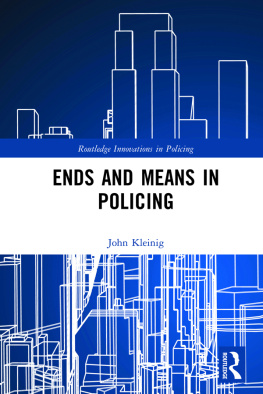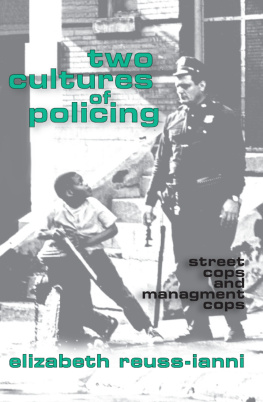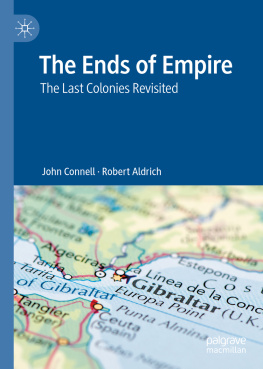Ends and Means in Policing
Policing is a highly pragmatic occupation. It is designed to achieve the important social ends of peacekeeping and public safety, and is empowered to do so using means that are ordinarily seen as problematic; that is, the use of force, deception, and invasions of privacy, along with considerable discretion. It is often suggested that the ends of policing justify the use of otherwise problematic means, but do they?
This book explores this question from a philosophical perspective. The relationship between ends and means has a long and contested history both in moral/practical reasoning and public policy. Looking at this history through the lens of policing, criminal justice philosopher John Kleinig explores the dialectic of ends and means (whether the ends justify the means, or whether the ends never justify the means) and offers a new, sharpened perspective on police ethics.
After tracing the various ways in which ends and means may be construed, the book surveys a series of increasingly concrete issues, focusing especially on those that arise in policing contexts. The competing moral demands made by ends and means culminate in considerations of noble cause corruption, dirty hands theory, lesser degradations (such as tear gas, tasers, chokeholds, and so on), and finally, those means deemed impermissible by the majority in Western culture, such as torture.
John Kleinig is an Emeritus Professor of Philosophy in the Department of Criminal Justice, John Jay College of Criminal Justice, and in the PhD Program in Philosophy, Graduate School and University Center, City University of New York. He is also an Adjunct Research Professor at Charles Sturt University, Australia. He is the author/editor of 22 books.
Routledge Innovations in Policing
Edited by Ellen Boyne
This series explores innovations in the field of policing and offers the latest insight into the field through research, theoretical applications, case studies, and evaluations. Famous innovations developed over the course of the late twentieth century and into the turn of the twenty-first include approaches such as community policing, broken windows policing, problem-oriented policing, pulling levers policing, third-party policing, hot spots policing, CompStat, and evidence-based policing. Some of these approaches have been successful, and some have not, while new innovations continue to arise. Improving police performance through innovation is often not straightforward. Police departments are highly resistant to change, but through such research we expect to find further refinement of our knowledge of what works in policing, under what circumstances particular strategies may work, and why these strategies are effective in improving police performance.
Police Militarization
Understanding the Perspectives of Police Chiefs, Administrators, and Tactical Officers
Scott W. Phillips
United Nations International Police Officers in Peacekeeping Missions
A Phenomenological Exploration of Complex Acculturation
Michael R. Sanchez
Ends and Means in Policing
John Kleinig
For more information about this series, please visit: www.routledge.com/Routledge-Innovations-in-Policing/book-series/RIP
First published 2019
by Routledge
52 Vanderbilt Avenue, New York, NY 10017
and by Routledge
2 Park Square, Milton Park, Abingdon, Oxon, OX14 4RN
Routledge is an imprint of the Taylor & Francis Group, an informa business
2019 Taylor & Francis
The right of John Kleinig to be identified as author of this work has been asserted by him in accordance with sections 77 and 78 of the Copyright, Designs and Patents Act 1988.
All rights reserved. No part of this book may be reprinted or reproduced or utilised in any form or by any electronic, mechanical, or other means, now known or hereafter invented, including photocopying and recording, or in any information storage or retrieval system, without permission in writing from the publishers.
Trademark notice: Product or corporate names may be trademarks or registered trademarks, and are used only for identification and explanation without intent to infringe.
Library of Congress Cataloging-in-Publication Data
Names: Kleinig, John, 1942 author.
Title: Ends and means in policing / John Kleinig.
Description: Abingdon, Oxon ; New York, NY : Routledge, 2019. |
Includes index.
Identifiers: LCCN 2018049500 (print) | LCCN 2018051452 (ebook) |
ISBN 9780367025311 (Ebook) | ISBN 9780367025281 (hardback)
Subjects: LCSH: Police ethics. | Ends and means. | PolicePhilosophy.
Classification: LCC HV7924 (ebook) | LCC HV7924 .K549 2019 (print) |
DDC 174/.93632dc23
LC record available at https://lccn.loc.gov/2018049500
ISBN: 978-0-367-02528-1 (hbk)
ISBN: 978-0-367-02531-1 (ebk)
Typeset in Bembo
by Apex CoVantage, LLC
It often appears as though those who believe that the ends justify the means and those who do not believe that they do possess quite different and even opposing moral sensibilitiescorresponding, perhaps, to that seemingly great divide in moral theory between those who place their trust in some form of consequentialism and those who eschew it. Simplistic though it is to render the contrast in that way, it helps to account for a longtime fascination with the ends-means relationship. It has the added attraction of capturing pivotal terms in many theories of practical reason, which cast themselves in terms of the relation of means to ends. It was not until 1990, when I had already begun working on police ethics and encountered Giuliano Pontaras doctoral dissertation Does the End Justify the Means? A Metaethical and Normative Study that the idea of linking a discussion of police ethics with an exploration of the dialectic of ends and means began to take some shape. At that time, formal discussions of police ethics were in their infancy and, apart from Pontaras dissertation, which was now somewhat dated and never published, the ends-means dialectic was often dealt with somewhat peremptorily or by philosophers such as Dewey, who had become unfashionable in the circles in which I moved.
But other projects intervened, and though some of them lent themselves to a treatment that would have involved the means-ends controversy, the thought of bringing the two together was placed on a back burner. Other projects completed, I now have the opportunity to engage in a more synthetic assignment. That said, a good deal of what I may originally have wished to include in a book on ends and means in policing was incorporated in an earlier book, The Ethics of Policing (1996). In certain respects, the current volume is to be seen as a follow-up to that earlier one, albeit through a distinctive lens, and in the present volume I have often traveled lightly over issues and examples that were dealt with at greater length in the earlier one.
Although I had originally hoped to draft and test the materials as part of a doctoral course, that was not to be. I am grateful to the (sadly, now defunct) Centre for Applied Philosophy and Public Ethics, Charles Sturt University, for providing some of the initial the conditions for bringing the materials .
In writing this book, I have drawn upon (and frequently revised material from) a number of earlier publications, including The Ethics of Policing (New York: Cambridge University Press, 1996); Noble Cause Corruption or Process Deviance: Ruminations on Means and Ends in Policing, in Uncertainty, Vol. 4: Police Corruption, Paradigms, Models and Concepts , eds. Stanley Einstein and Menachem Amir (Huntsville, TX: OICJ Press, 2004), 12946; Torture and Political Morality, in Politics and Morality , ed. Igor Primoratz (Basingstoke: Palgrave Macmillan, 2007), 20927; Ethics and Criminal Justice: An Introduction (Cambridge, UK: Cambridge University Press, 2008); Ticking Bombs and Torture Warrants, Deakin Law Review 10, no. 2 (2005): 61427; Legitimate and Illegitimate Uses of Police Force, Criminal Justice Ethics 33, no. 2 (2014): 83103; Punishment and the Ends of Policing, in Liberal Criminal Theory: Essays for Andreas von Hirsch , ed. A.P. Simester and A. Du Bois-Pedain (Oxford: Hart, 2014), 283303; and Trust and Critical Thinking, Educational Philosophy and Theory 50, no. 2 (2017): 13343.




